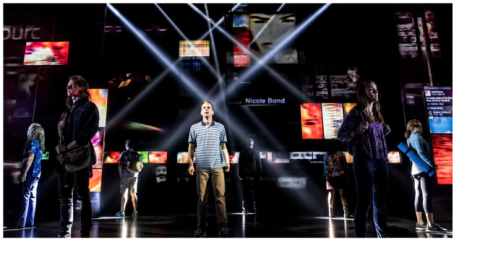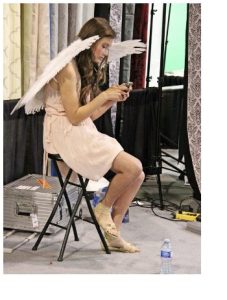NOTE: This post is sexually explicit and full of naughty things. Feel free to skip it in favor of something more uplifting and G-rated. Seriously.
If you were around in the 1980s, you probably remember this radio hit from The Cars:
I know tonight, she comes – she’s taking a swipe at fun
She tells me it’s easy when you do it right – I know tonight, she comes
Or this catchy little pop-gospel number, played endlessly on MTV and Top 40 radio:
I hear your voice – it’s like an angel sighing – I have no choice…
I close my eyes – oh God, I think I’m falling out of the sky…
When you call my name, it’s like a little prayer – I’m down on my knees, I wanna take you there
In the midnight hour, I can feel your power – just like a prayer, you know I’ll take you there
While it wasn’t exactly news by this time that Madonna was tawdry, most listeners heard or even sang along with these words without actually processing what they were describing. (Spoiler alert: she wasn’t actually praying, although “Oh God” may have been uttered a few times.)
The approach wasn’t entirely new. Cole Porter several generations before had done quite well with lyrical winking and nudging:
And that’s why birds do it – bees do it – even educated fleas do it – let’s do it – let’s fall in love…
Sloths who hang down from the twigs do it – though the effort is great
Sweet guinea pigs do it – buy a couple and wait!
The world admits bears in pits do it – even Pekingeses in the Ritz do it
Let’s do it – let’s fall in love
Sometimes it wasn’t even THAT subtle, and yet most of us missed it until re-watching with our own kids a generation later…
Go, greased lightnin’ – you’re burnin’ up the quarter mile
Go, greased lightnin’ – you’re coasting through the heat lap trials
You’re supreme – the chicks’ll cream – for greased lightnin’…
With new boosters, plates and shocks, I can get off my rocks
You know that I ain’t braggin’ – she’s a real pussy wagon – greased lightnin’
If you’d never noticed what Danny Zucko was getting at in this song, don’t feel bad. You may recall an episode of Arrested Development in which Michael and his niece Maeby were halfway through a rousing karaoke rendition of “Afternoon Delight” when it dawned on him what they were actually singing…
Thinking of you’s working up my appetite – looking forward to a little afternoon delight
Rubbing sticks and stones together makes the sparks ignite, and the thought of lovin’ you is getting so exciting
Sky rockets in flight – afternoon delight…
Started out this morning feeling so polite – I always thought a fish could not be caught who wouldn’t bite
But you’ve got some bait a-waiting and I think I might try, nibbling a little afternoon delight…
In short, there are endless examples of sexual innuendo and outright potty talk in rock’n’roll and other forms of popular music. It makes sense, given that art explores all sorts of things about the human experience, and sex – for better or worse – is a memorable and often complicated part of all that.
While we’ve certainly loosened up when it comes to intimate topics, most openly explicit stuff is just… boring. It requires little creativity and says nothing about the emotional dynamics typically implicit in such things. Lyrical porn is just like any other sort of porn – it may have a certain salacious appeal, but it’s not exactly “art.”
What can be interesting are the many ways writers use metaphors or imagery to hint at desire or sexual naughtiness without actually saying anything inappropriate – and why they choose to do so. I’m going to focus here on musical specimens with a focus on accessibility. Most examples from legit poetry or literature with which I’m familiar are centuries old, meaning the primary challenge isn’t so much rhetorical subtlety as obsolete language. Besides, I’m sure every English teacher has their own favorite dirty passages in the books they assign – stuff that Republicans would be wetting themselves to ban if they understood them in the first place.
There are THREE BASIC REASONS writers use sexual innuendo, although they sometimes overlap.
1) The writer wants to be suggestive without triggering censorship or criticism.
Here’s a segment of “If I Were A Bell” from Guys and Dolls, staged and filmed in the early 1950s:
From the moment we kissed tonight, that’s the way I’ve just gotta behave
Boy, if I were a lamp, I’d light – or if I were a banner, I’d wave
Ask me how do I feel, little me with my quiet upbringing
Well, sir, all I can say is if I were a gate, I’d be swinging…Ask me how do I feel – ask me now that we’re fondly caressing
Well, if I were a salad, I know I’d be splashing my dressing
Or if I were a season, I’d surely be spring…
Or if I were a bell, I’d go ding dong ding dong ding dong ding dong ding!
Lamps lighting and banners waving are certainly innocuous enough, but “swinging” has a hint of suggestiveness – although not enough by itself to trigger any suspicion. Add some caressing and the bit about losing your dressing, though, and it’s the tiniest bit blue. Almost.
It’s a beautiful thing, straddling such lines while still looking so wholesome.
The band Queen wasn’t exactly prudish, but neither were they willing in the late 1970s to come right out and celebrate the excessive drug use and bisexual one-night stands of lead singer and songwriter Freddie Mercury. Instead, we get lyrics like this from “Don’t Stop Me Now”:
Tonight, I’m gonna have myself a real good time
I feel alive, and the world – I’ll turn it inside out, yeah – I’m floating around in ecstasy
So don’t stop me now – don’t stop me, ’cause I’m having a good time…
I’m burning through the sky, yeah – 200 degrees, that’s why they call me Mr. Fahrenheit
I’m traveling at the speed of light – I wanna make a supersonic man out of you
I’m having such a good time – I’m having a ball – if you wanna have a good time, just give me a call
I’m on a rocket ship on my way to Mars on a collision course – I’m a satellite – I’m out of control
I am a sex machine ready to reload like an atom bomb – about to oh oh oh oh oh explode
I wanna make a supersonic woman of you… Let loose, honey, all right
If you didn’t know much about Mercury, you might be able to simply enjoy this as a generic party song – which most did. No one close to the band had ANY illusions, however, what these lyrics were really about.
2) The coy language reflects the flirting and uncertainty of the situation.
Here’s Kay Howard, fifth wife of Henry VIII, singing about her teenage years in the musical “Six”:
Take my first music teacher, Henry Mannox
I was young, it’s true, but even then I knew – the only thing you wanna to do is… (*kiss* / *sigh*)
Broad, dark, sexy Mannox taught me all about dynamics
He was twenty-three, and I was thirteen going on thirty
We’d spend hours strumming the lute, striking the chords and blowing the flute
He plucked my strings all the way to G – went from major to minor, C to D
There’s a mix of innuendo here, from the overt (“I was thirteen going on thirty”) to the metaphorical (“blowing the flute”). Context makes even the bits about plucking strings and changing keys sound dirty, even if we’re unable to identify exactly why that is.
Don’t worry – it gets easier:
But then there was another guy – Francis Dereham…
Serious, stern and slow – gets what he wants, and he won’t take no…
Helped him in his office, had a duty to fulfill – he even let me use his favorite quill
Spilled ink all over the parchment – my wrist was so tired – still I came back the next day as he required
In this case the double entendres are both amusing and tragic. On the one hand, you can almost picture their loaded interactions in the guise of workplace activity – the looks, the incidental contact, etc. On the other hand, Howard is essentially a young lady being sexually exploited by older men in a time when women had even less social capital than they do today. The song moves from sorta fun and sassy to angry and broken at the end, and the metaphors and innuendo of those early verses help emphasize that transition.
It doesn’t have to be quite so intense. Here’s a bit from “Brand New Key” by Melanie from the early 1970s (and covered multiple times since then):
I rode my bicycle past your window last night – I roller-skated to your door at daylight
It almost seems like you’re avoiding me – I’m okay alone, but you’ve got something I need
Well, I’ve got a brand new pair of roller skates, you’ve got a brand new key
I think that we should get together and try them on to see…I ride my bike, I roller skate, don’t drive no car – don’t go so fast, but I go pretty far…
Well, I’ve got a brand new pair of roller skates, you’ve got a brand new key
I think that we should get together and try them on to see…
If you try to pin it down as a direct sex metaphor, it doesn’t really work. At the same time, it’s undeniable that the lyrics flirt with the potential double meaning – just like the singer is apparently flirting with her little friend.
3) It’s supposed to be funny.
What makes something funny is an eternally evasive question which varies from person to person and generation to generation. In general, however, sex and love are fertile grounds for humor because they’re so universal and so universally awkward to ponder or attempt.
This is easily the riskiest of the three. When it works, the results can be sublime – or at least clever. Sexual innuendo gone wrong, on the other hand, quickly veers into crass, offensive, or juvenile.
Here’s a Christmas song from Anna and the Apocalypse which walks a shaky line between these extremes:
There’s a lack of presents in my stocking – and my chimney needs a good unblocking
Come on Santa dear, I’ve been waiting for you
Lemme tell you, if you’re feeling frozen stiff, my fire’s burning hot for you
Before you take a nap, let me sit upon your lap
There’s only one gift that I wanna unwrap when you’re near – Baby, it’s that time of year…
I’ve warmed your milk and made your favorite snack, so come on over and unload your sack
Tie those reindeer up – ’cause you may be a while – and I know what’ll make you smile…
Come on Santa, give it to me
In the context of the film, the tune is intended to be sexy and suggestive (as per #2 above). As a number in a musical, however, it’s primarily meant to be funny. The metaphorical innuendo is intentionally awkward (“my chimney needs a good unblocking”) and at times so explicit (“unload your sack”) that the audience is clearly intended to be in on the joke.
In other words, the rhetorical games act as overt double agents – metaphor and innuendo intended to toy with sexually explicit messaging, but nudged just far enough over the edge to allow us to laugh at them while they do it… all without quite coming out and saying anything R-rated.
The at-times-brilliant The Book of Mormon, in contrast, reaches WAY too far with “Baptize Me”:
I’m about to do it for the first time, and I’m gonna do it with a girl – a special girl who makes my heart kinda flutter – makes my eyes kinda blur – I can’t believe I’m about to baptize her!
Bathe her in God’s glory! And I will baptize her with everything I got – and I’ll make her beg for more as I wash her free of sin – and it’ll be so good, she’ll want me to baptize her again!
Believe it or not, it gets worse from there. That’s probably why the most successful humorous innuendo is often fairly succinct – get in, get out, and move on before they know what hit them.
Excerpt of “My Dead Gay Son” from Heathers:
They’re up there disco dancing to the thump of angel wings
They grab a mate and roller skate while Judy Garland sings
They live a playful afterlife that’s fancy-free and reckless
They swing upon the pearly gates and wear a pearly necklace
Then again, so much of Heathers is edgy that perhaps such moments fit right in.
I’ll close with a combination of all three. “I Love The Way” from Something Rotten! is a duet initiated by Portia, a young Puritan who feels compelled to mask any sinful feelings like love or the enjoyment of literature from her family (and to some extent herself). Her (musical) conversation with Nigel – a playwright – is flirty and awkward, just like their new feelings toward one another. For the audience, however, it’s neither subtle nor titillating. It’s just supposed to be funny.
Portia: I love Sydney, and Marlow, and often I borrow their words to express how I feel. I love poems of mystery, fantasy, history – oh, what seductive appeal! At night, alone in my bedroom, satisfying my need – the candlelight fire ignites my desire… to read! …
I love the places that words let me go – I love the way that your words move me so! No words have touched me the way that yours do…
I find pleasure perusing those writings and musing so often I pleasure myself – wait, that didn’t sound right
Nigel: No, I know what you mean – when I’m deep in the throes of impassionate prose, I could scream!
Portia (spoken): You scream?
Nigel (spoken): Yeah.
Portia (spoken): So do I!
Portia: Oh, I love a lilting line of lyrical alliteration… when the phrases come together like a consummation
Nigel: It’s sweet elation!
Those crazy Renaissance lovebirds.
I hope you found this post as fulfilling as I did. I’d hoped it would last longer, but somehow I got out everything I had to say with time to spare (sorry about that). I hear it happens to lots of writers. Hey, any chance you have a cigarette?



 I’m about to commit the gravest of blasphemies against ELA doctrine, so I might as well get it out of the way up front.
I’m about to commit the gravest of blasphemies against ELA doctrine, so I might as well get it out of the way up front.